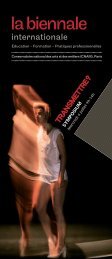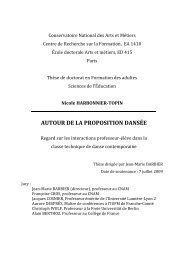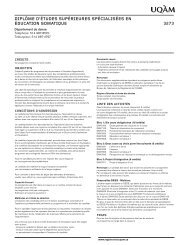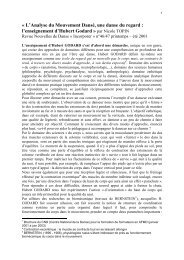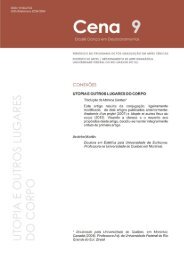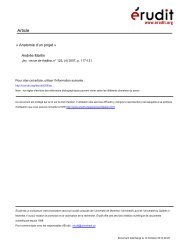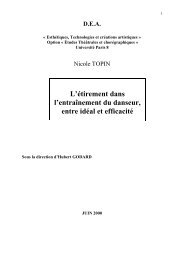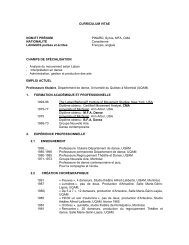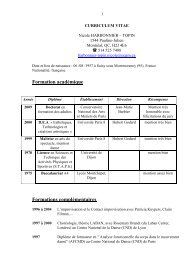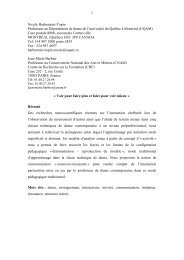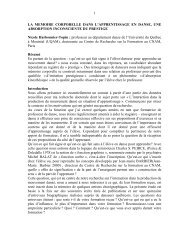Day 2 - Département de danse - UQAM
Day 2 - Département de danse - UQAM
Day 2 - Département de danse - UQAM
You also want an ePaper? Increase the reach of your titles
YUMPU automatically turns print PDFs into web optimized ePapers that Google loves.
c) Canadian Dramaturgies: Losses, Processes, and the “Unclogged Soul” McIntyre<br />
Open Panel Mo<strong>de</strong>rator: James Hoffman (Thompson Rivers University)<br />
“The Comedy of Loss: The Plays of Morris Panych.” David Owen (York University)<br />
Everything began to spin and I found myself sitting on the ground: I laughed so hard I cried. (Sartre)<br />
Mirroring Irving Wardle’s coinage of the term “comedy of menace” in reference to the early plays of Harold Pinter, I will <strong>de</strong>fine<br />
a stylistic consistency in the plays of Morris Panych that I label a “comedy of loss.” In every play by Morris Panych, someone<br />
loses something. In fact, in most cases, at least one character literally loses something during every scene. This loss may be<br />
subtle like a change of status, loss of innocence, disillusionment or it may be obvious and tangible like the loss of a specific<br />
item, a limb or even the <strong>de</strong>ath of another character. This sense of constant loss informs much of the dramatic tension within<br />
his work and by the end of his plays, the characters are usually in a <strong>de</strong>sperate place. Looking at four of his plays: Vigil (1995),<br />
Lawrence and Holloman (1998), What Lies Before Us (2007) and The Trespassers (2009) I will illustrate this stylistic<br />
consistency centered on loss. I chose these plays because I was involved with Vigil as assistant director at Theatre Calgary in<br />
2007 and I directed a production of Lawrence and Holloman for Image Theatre in Edmonton in 2006. The two other plays—<br />
What Lies Before Us and The Trespassers—also fit the pattern I noticed earlier, loss being at the centre of all four. Expanding<br />
on a connection ma<strong>de</strong> by Esslin between Beckett’s plays and Sartre’s philosophy I will illustrate how Panych’s characters are<br />
forced to face their own existential self-<strong>de</strong>ception and I will draw a parallel between Panych’s comedic wordplay and Esslin’s<br />
<strong>de</strong>scription of Pinter’s use of language that spurred Wardle’s “comedy of menace” label.<br />
“The Edges of Influence: Dramaturging The Wedding Script.” Jessica Riley (University of<br />
Guelph)<br />
“He was as integral to my <strong>de</strong>velopment as a playwright as my hands are to my body.” So wrote Judith Thompson of her longtime<br />
dramaturge, the late Urjo Kareda. In the narrative surrounding the evolution of Canadian theatre since the 1970s, Kareda<br />
has been <strong>de</strong>scribed as the “archetypal enthusiast,” a champion of Canadian playwriting and integral contributor to the careers<br />
of many of our most well-known playwrights. Recognition of Kareda as a figure of consi<strong>de</strong>rable influence on Canadian<br />
playwriting, however, is double-edged: Kareda’s <strong>de</strong>velopmental dramaturgy as Artistic Director of Tarragon Theatre (1982-<br />
2001) also drew criticism, most famously from Michael Devine, whose 1988 article, “Tarragon: Playwrights Talk Back,” asserts<br />
that play <strong>de</strong>velopment un<strong>de</strong>r Kareda—specifically in the Tarragon Playwrights Unit—was biased toward Kareda’s personal<br />
preference for character-driven poetic naturalism.<br />
This paper, which builds on my 2012 contribution to CATR, “The Dramaturge as Hyphen-ated Artist-Scholar,” will further<br />
explore the “edge” or “fine point” where artistic and analytic input may be seen to intersect in Kareda’s <strong>de</strong>velopmental<br />
dramaturgy. In this case, I examine the nature and implications of Kareda’s dramaturgical influence on a play <strong>de</strong>veloped in the<br />
1984-85 Tarragon Playwright’s Unit, Don Hannah’s The Wedding Script. Drawing on original archival research, including the<br />
analysis of over 15 extant drafts of The Wedding Script, this paper tests the assertions ma<strong>de</strong> in Devine’s article—which was<br />
written on the basis of anecdotal evi<strong>de</strong>nce culled from a small survey of selected Playwrights Unit participants—offering a<br />
nuanced examination of the evi<strong>de</strong>nce of Hannah’s negotiation of Kareda’s dramaturgical input and assessing the effect of this<br />
negotiation on the trajectory of the play as it <strong>de</strong>veloped from draft to draft.<br />
“‘Unclogging his Soul’: Seven New Plays by George F. Walker.” Chris Johnson (University of<br />
Manitoba)<br />
George F. Walker has written seven new plays for the stage. These works were completed in a little more than a year,<br />
between the spring of 2011 and the summer of 2012, following a period of several years during which Walker wrote primarily<br />
for television. TV writing, he suggested in an email, had “clogged his soul,” and when he stopped working in that medium, the<br />
new stage work “just poured out.”<br />
One of these new plays is the much anticipated Dead Metaphor, which premiered at the American Conservatory Theater<br />
in San Francisco at the end of February. The others have not yet been produced, and have been published only in electronic<br />
form for Amazon Kindle. Moss Park brings back Bobby and Tina from Walker’s 1993 play, Tough! The other five (Kindred, The<br />
Unacquainted, We the Family, The Bur<strong>de</strong>n of Self Awareness, and All This Is True) introduce entirely new characters to the<br />
stage although all seven can be located within the well-established East End realm of Walker’s imagined urban jungle. All are<br />
dark comedies, employing that “elegant <strong>de</strong>adpan humour and a self-conscious inversion of values” that Wasserman <strong>de</strong>scribes<br />
as “Walkeresque.”<br />
My paper attempts to place the new plays within the context of Walker’s work as a whole thus far, and examines some of<br />
the inversions he employs within them, some of the strategies with which he ambushes his audience, disrupting their<br />
expectations and interrogating their assumptions. I’m interested in a new emphasis on stereotype, race, and ethnicity and the<br />
challenges these present to the progressive sensibility—we saw these concerns arise in Heaven, and he returns to them in<br />
We the Family, The Unacquainted, and Kindred. I’m also interested in his attention to current events and issues: right wing<br />
political exploitation of the military in Dead Metaphor, for example, or the “personhood” of the corporation in Kindred. Finally,<br />
I’m fascinated by Walker’s attention to and use of <strong>de</strong>ath in the new plays: sud<strong>de</strong>n <strong>de</strong>ath as joke, the imminence of <strong>de</strong>ath as<br />
dramatic motivation, and in some of the plays, <strong>de</strong>ath transfigured by the return of the <strong>de</strong>ad, anticipated in Heaven and And So<br />
It Goes, and further <strong>de</strong>veloped here.<br />
15



